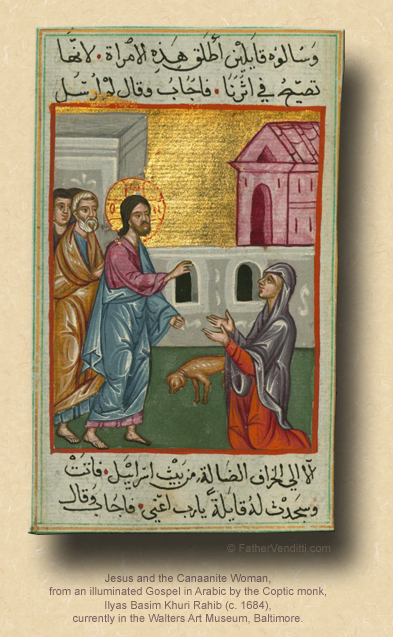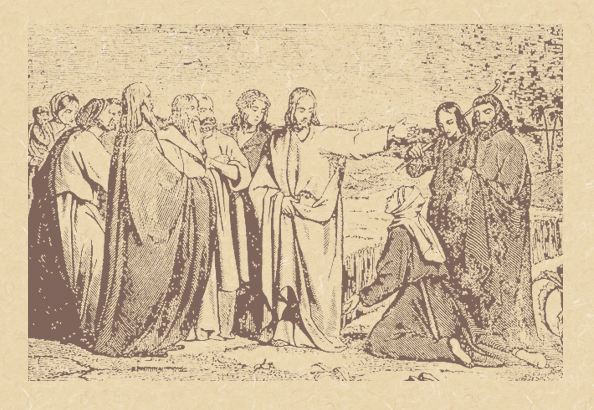We Can't Follow the Lord on Our Own Terms.
The Memorial of Saints Cyril, Monk, & Methodius, Bishop.*
Lessons from the primary feria, according to the ordinary form of the Roman Rite:
• Genesis 2: 18-25.
• Psalm 128: 1-5.
• Mark 7: 24-30.
|
…or, from the proper:
• Acts 13: 46-49.
• Psalm 117: 1-2.
• Luke 10: 1-9.
…or, any lessons from the common of Pastors for Missionaries, or the common of Holy Men & Women.
|
The Fifth Thursday after Epiphany; and, the Commemoration of Saint Valentine, Priest & Martyr.**
Lessons from the dominica,*** according to the extraordinary form of the Roman Rite:
• Colossians 3: 12-17.
• Psalm 101: 16-17.
• Matthew 13: 24-30.
|
When a Mass for the commemoration is taken, lessons from the common "In virtúte…" for a Martyr not a Bishop:
• Wisdom 10: 10-14.
• Psalm 111: 1-2.
• Matthew 10: 34-42.
|
FatherVenditti.com
|
10:13 AM 2/14/2019 — Those of a purely elementary faith—those unpracticed in the movements of the soul through the interior life—would be very confused with today's Gospel lesson; for, in it, our Blessed Lord is approached by a woman who is drawn to Him solely by faith, seeking nothing for herself, but begging Him to help her tormented daughter. She's persistent, so much so that, in Matthew's account of this encounter, the disciples ask him to “Rid us of her..., she is following us with her cries” (Matt. 15: 23 Knox). He turns to her and says, “Let the children have their fill first; it is not right to take the children’s bread and throw it to the dogs.” (Mark 7: 27 Knox); in other words, I'm not going to help you; you're not even a Jew. And I'm sure you're waiting with baited breath for me to explain to you how our Lord isn't really saying what he seems to be saying, and how this is all the result of some inferior translation, which is something that I often like to do.
But I'm not going to do that, because there's nothing wrong with this translation. He appears to be rude to this poor woman because He is. He seems to be telling her that, because she's not of the same nationality as He, He's not interested in her problem because that, in fact, is what He's telling her. There is no mistake. He even goes so far as the get personally abusive, telling her, “It is not right to take the children’s bread and throw it to the dogs.”
Of course, there is a method in our Lord's madness which has deep implications for our interior life. Consider first how this poor woman reacts to this very brazen insult: "Yes, Lord, yet even the dogs eat the crumbs that fall from their masters' table" (v. 28 RSV). Now, I don't think there's a woman here who, if they went to a man for help, and he responded by calling her a dog, wouldn't just haul off and slap him silly; but, remember, this woman is desperate.  Saint Anselm tells us, in one of his homilies (cf. Golden Chain, MT-MK 4521), that it's clear from the text that this woman clearly believed that Jesus was God, something that most of the Jews with our Lord that day probably didn't yet realize. Keep in mind, too, that she's a Syrophenician; in the Old Testament they were called Canaanites. After the Exodus, the Jews conquered them and took their land for themselves, converting them to Judaism; but, by our Lord’s time the Syrophenicians had abandoned the faith and fallen into apostasy, so the Jews threw them out of Israel so as not to be corrupted by them. She's sneaked back across the border for the sole purpose of asking our Lord to help her tormented daughter; she doesn't even want anything for herself. And I think it's safe to assume that there's more than one person here today who will testify that desperation has a way of tearing down the walls of pride. She's come there with a mission, and she's not about to let anything derail her from it, even if it means she has to swallow her pride and take an insult without responding to it. Saint Anselm tells us, in one of his homilies (cf. Golden Chain, MT-MK 4521), that it's clear from the text that this woman clearly believed that Jesus was God, something that most of the Jews with our Lord that day probably didn't yet realize. Keep in mind, too, that she's a Syrophenician; in the Old Testament they were called Canaanites. After the Exodus, the Jews conquered them and took their land for themselves, converting them to Judaism; but, by our Lord’s time the Syrophenicians had abandoned the faith and fallen into apostasy, so the Jews threw them out of Israel so as not to be corrupted by them. She's sneaked back across the border for the sole purpose of asking our Lord to help her tormented daughter; she doesn't even want anything for herself. And I think it's safe to assume that there's more than one person here today who will testify that desperation has a way of tearing down the walls of pride. She's come there with a mission, and she's not about to let anything derail her from it, even if it means she has to swallow her pride and take an insult without responding to it.
And here is where we are able to deduce the method in our Lord's madness. He's not so much testing her;—as Saint Anselm told us, she already believes He's God, and He knows this, so he doesn't need to test her faith—but, she does need to be instructed as to why she's doing what she's doing. She's gone there because—as we've said three times now—she's desperate. Her daughter is suffering, she knows that Jesus is in a particular place at a particular time, so she's off. She's not even thinking clearly. By treating her the way he does initially, our Lord forces her to put the breaks on and think about what she's doing, not because there's anything wrong with what she's doing, but because He wants her to understand her own actions: Propter hunc sermonem vade: exiit dæmonium a filia tua—“In reward for this word of thine, back home with thee; the devil has left thy daughter.” (v. 29 Knox). She had no idea that she was acting out of faith, but now she does, and so do the disciples who had initially begged him to send her away.
There is not a person here who hasn't suffered a tragedy or endured a hardship or borne a cross that hasn't caused us to wonder what on earth God is up to. Like the Syrophenician woman, we are already people of faith, and so we ask, “Why is this happening? What have I done wrong?” The answer is that we've done nothing wrong; but, if God were to reveal to us the reason for our suffering, or show us His plan for us or the souls of others that will be converted and saved by our trials and sacrifices, then there would be no merit in the sacrifice. When one sets out to serve the Lord, one doesn't do what one wants; one does what one is told. Saint Paul said it better:
How deep is the mine of God’s wisdom, of his knowledge; how inscrutable are his judgements, how undiscoverable his ways! Who has ever understood the Lord’s thoughts, or been his counsellor? (Rom. 11: 33-34 Knox).

* The great Apostles to the Slavs were brothers from Greece, who brought the faith to Eastern Europe as monks, specifically Bulgaria, Moravia and Bohemia, establishing Churches according to the Constantinopolitan or Byzantine Tradition prior to the Great Schism. Eventually, they traveled to Rome to beg the blessing of Pope Adrian II, who officially approved of their hand-written liturgical books in which they had translated the Divine Liturgy of St. John Chrysostom into the vernacular language of Eastern Europe, an unwritten language called "Slavonic," for which Cyril created an alphabet (i.e. "Cyrlic") and which is now the root of all Slavic tongues. Cyril died in Rome in A.D. 870; Methodius was consecrated a bishop by Pope Adrian, and returned alone to Eastern Europe to continue the mission, dying there in 886. Pope St. John Paul II proclaimed the two brothers Co-Patrons of Europe alone with St. Benedict.
** Valentine was a priest who, along with a number of other pious Christians, encouraged a great number of martyrs during the persecution of Aurelian. He, himself, suffered martyrdom under the same emperor in A.D. 270.
*** In the extraordinary form, on ferias outside privileged seasons, the lessons come from the previous Sunday.
|

